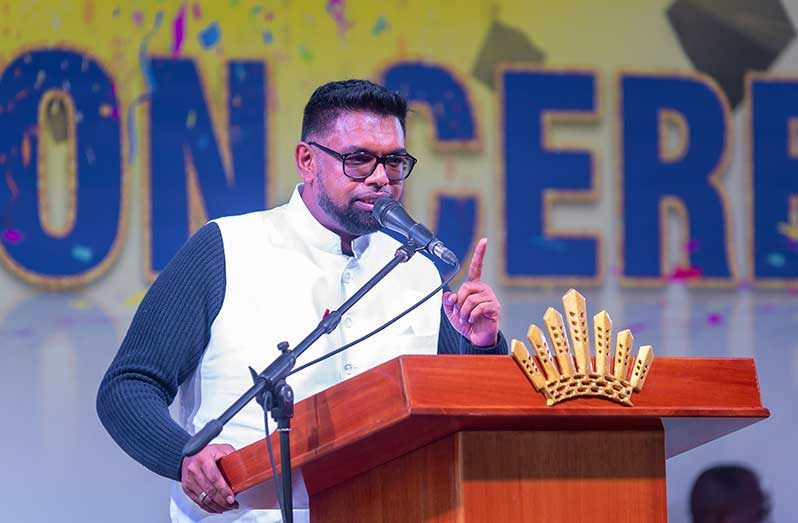–President Ali says gov’t focused on key priorities, not unproductive spending
PRESIDENT Dr. Irfaan Ali has made it clear that the People’s Progressive Party/Civic (PPP/C) government is carefully spending on national priorities meant to promote equity, generate employment, and enhance the country’s competitiveness, as opposed to any wasteful expenditures.
The President clearly outlined the government’s expenditure profile and plans in a Sunday evening address that was broadcast live from his official residence, State House. He did so juxtaposing the current administration’s plans with those of the former A Partnership for National Unity + Alliance For Change (APNU+AFC) government, which was in office from 2015 to 2020.
Dr. Ali pointed out that the former administration had a comparatively smaller capital expenditures bill, which means that less money went towards the construction of critical infrastructure, improving social services, and creating a more business-friendly environment.
He posited that his administration has, however, focused on more productive spending. And the productive expenditures, he said, align with the Party’s 2020 Manifesto.
“The spending on capital projects by this PPP/C government is aligned with the 2020 Manifesto, through which the People of Guyana elected us, and is aimed at delivering first-class social services, improved access to healthcare, quality education, improved water, (and) an expansion of the healthcare system,” President Ali highlighted.
Some of the key projects undertaken, he highlighted, include the construction of new regional and community hospitals. He also noted that the PPP/C government is helping citizens to generate wealth, whether by creating an enabling environment for them to work and prosper, or by increasing salaries and returning bonuses that were revoked by the APNU+AFC coalition.

The President contended, too, that the massive spending on infrastructure, from highways to bridges, is all part of a masterplan to foster development for citizens all across the country. He also said that better infrastructure means improved access to more local communities, and, overall, enhances the communities’ and country’s competitiveness.
“This is where the investment is going; to reduce the infrastructure gap, this is what helps to bring equity to regions,” he said.
President Ali added, “Without the investment in physical infrastructure, it would not be possible to improve the country’s international competitiveness. If we don’t do this, how are we going to improve our international competitiveness?”
Focusing on the government’s serious investments in physical infrastructure, the President noted that the Inter-American Development Bank (IDB) is one body that stressed the need for Guyana to improve its transportation network. Without a robust network, the IDB believes that Guyana’s competitiveness would be hamstrung and economic expansion, diminished.
According to President Ali, the IDB also estimated that between US$9.4 billion to US$23.8 billion would be needed by 2030 to improve the local transportation network, expand the energy grid, improve water and sanitation facilities, and expand the telecommunication sector. He said his government is cognisant of the investments required, and has already invested in all of these areas.
“(This is) exactly what we are doing; exactly where the PPP/C expenditure profile is, and what we are targetting,” the Head of State emphasised.
And Dr. Ali contended that major investments countrywide have spurred economic activity, and, resultantly, job creation.
As a matter of fact, he said skilled, semi-skilled, and unskilled citizens are capitalising on the booming economy, finding “high-paying” employment opportunities in many fields, such as the construction sector. The President said this was yet another way the government’s prioritised spending was impacting local development.
Though he chastised the APNU+AFC administration for their wasteful spending during their five-year term in office, the President assured Guyanese that his government is doing all it can to guarantee that the country’s prospects are better.





.jpg)








